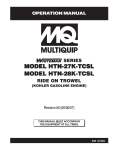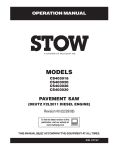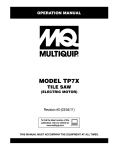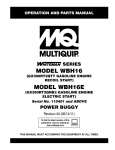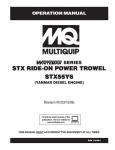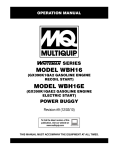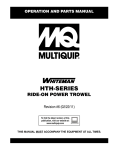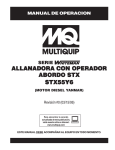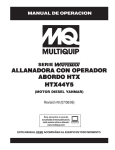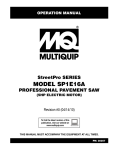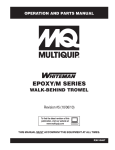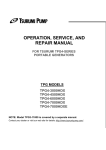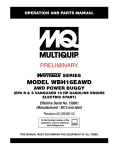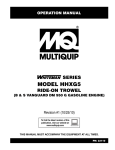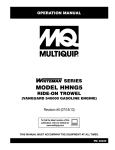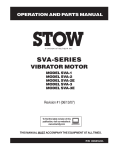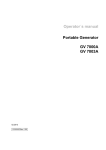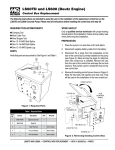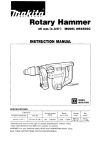Download Multiquip pro12 User's Manual
Transcript
Operation Manual SERIES MODEL PRO12 HYDRAULIC PLASTER/MORTAR MIXER (HONDA GX390RT2-QNB2 GASOLINE ENGINE) Revision #0 (05/06/13) To find the latest revision of this publication, visit our website at: www.multiquip.com THIS MANUAL MUST ACCOMPANY THE EQUIPMENT AT ALL TIMES. proposition 65 warning Engine exhaust and some of its constituents, and some dust created by power sanding, sawing, grinding, drillingandotherconstructionactivities contains chemicals known to the State of California to cause cancer, birth defects and other reproductive harm. Some examples of these chemicals are: Leadfromlead-basedpaints. Crystalline silicafrombricks. Cementandothermasonryproducts. Arsenicandchromiumfromchemically treatedlumber. Your risk from these exposures varies, depending on how often you do this type of work. To reduce your exposure to these chemicals: ALWAYS work in a well ventilated area, and work with approved safety equipment, such as dust masks that are specially designed to filter out microscopic particles. page 2 — Pro12 hydraulic mixer • operation manual — rev. #0 (05/06/13) silicosis/respiratory warnings WARNING WARNING SILICOSIS WARNING RESPIRATORY HAZARDS Grinding/cutting/drilling of masonry, concrete, metal and other materials with silica in their composition may give off dust or mists containing crystalline silica. Silica is a basic component of sand, quartz, brick clay, granite and numerous other minerals and rocks. Repeated and/or substantial inhalation of airborne crystalline silica can cause serious or fatal respiratory diseases, including silicosis. In addition, California and some other authorities have listed respirable crystalline silica as a substance known to cause cancer. When cutting such materials, always follow the respiratory precautions mentioned above. Grinding/cutting/drilling of masonry, concrete, metal and other materials can generate dust, mists and fumes containing chemicals known to cause serious or fatal injury or illness, such as respiratory disease, cancer, birth defects or other reproductive harm. If you are unfamiliar with the risks associated with the particular process and/or material being cut or the composition of the tool being used, review the material safety data sheet and/or consult your employer, the material manufacturer/supplier, governmental agencies such as OSHA and NIOSH and other sources on hazardous materials. California and some other authorities, for instance, have published lists of substances known to cause cancer, reproductive toxicity, or other harmful effects. Control dust, mist and fumes at the source where possible. In this regard use good work practices and follow the recommendations of the manufacturers or suppliers, OSHA/NIOSH, and occupational and trade associations. Water should be used for dust suppression when wet cutting is feasible. When the hazards from inhalation of dust, mists and fumes cannot be eliminated, the operator and any bystanders should always wear a respirator approved by NIOSH/MSHA for the materials being used. Pro12 hydraulic mixer • operation manual — rev. #0 (05/06/13) — page 3 Table of Contents PRO12 Hydraulic Mixer Proposition 65 Warning............................................ 2 Silicosis/Respiratory Warnings................................. 3 Table Of Contents..................................................... 4 Safety Information................................................. 5-8 Specifications........................................................... 9 Dimensions............................................................. 10 General Information................................................ 11 Mixer Components............................................ 12-13 Hydraulic Components...................................... 14-15 Basic Engine........................................................... 16 Paddle Blade Adjustment....................................... 17 Inspection.......................................................... 18-19 Startup............................................................... 20-21 Operation................................................................ 22 Maintenance...................................................... 23-25 Troubleshooting................................................. 26-28 Hydraulic System Locator....................................... 30 Hydraulic System Diagram..................................... 31 NOTICE Specifications and part numbers are subject to change without notice. page 4 — Pro12 hydraulic mixer • operation manual — rev. #0 (05/06/13) Safety Information Do not operate or service the equipment before reading the entire manual. Safety precautions should be followed at all times when operating this equipment. Failure to read and understand the safety messages and operating instructions could result in injury to yourself and others. Potential hazards associated with the operation of this equipment will be referenced with hazard symbols which may appear throughout this manual in conjunction with safety messages. Symbol Safety Hazard saFety messages The four safety messages shown below will inform you about potential hazards that could injure you or others. The safety messages specifically address the level of exposure to the operator and are preceded by one of four words: danger, warning, caution or notice. Lethal exhaust gas hazards Explosive fuel hazards saFety symBols danger Indicates a hazardous situation which, if not avoided, will result in death or serious inJury. Burn hazards warning Indicates a hazardous situation which, if not avoided, COuLD result in death or serious inJury. Rotating parts hazards caution Indicates a hazardous situation which, if not avoided, COuLD result in minor or moderate inJury. NOTICE Addresses practices not related to personal injury. Pro12 hydraulic mixer • operation manual — rev. #0 (05/06/13) — page 5 Safety Information general saFety caution never operate this equipment without proper protective clothing, shatterproof glasses, respiratory protection, hearing protection, steel-toed boots and other protective devices required by the job or city and state regulations. Avoid wearing jewelry or loose fitting clothes that may snag on the controls or moving parts as this can cause serious injury. never operate this equipment when not feeling well due to fatigue, illness or when under medication. never operate this equipment under the influence of drugs or alcohol. NOTICE This equipment should only be operated by trained and qualified personnel 18 years of age and older. Whenever necessary, replace nameplate, operation and safety decals when they become difficult read. Manufacturer does not assume responsibility for any accident due to equipment modifications. Unauthorized equipment modification will void all warranties. never use accessories or attachments that are not recommended by Multiquip for this equipment. Damage to the equipment and/or injury to user may result. always know the location of the nearest fire extinguisher. always know the location of the nearest first aid kit. always know the location of the nearest phone or keep a phone on the job site. Also, know the phone numbers of the nearest ambulance, doctor and fire department. This information will be invaluable in the case of an emergency. always clear the work area of any debris, tools, etc. that would constitute a hazard while the equipment is in operation. always check the equipment for loosened threads or bolts before starting. do not use the equipment for any purpose other than its intended purposes or applications. page 6 — Pro12 hydraulic mixer • operation manual — rev. #0 (05/06/13) Safety Information mixer saFety danger never operate the equipment in an explosive atmosphere or near combustible materials. An explosion or fire could result causing severe bodily harm or even death. do not mix flammable or explosive substances. warning never place your hands inside the drum while starting or operating this equipment. never disconnect any emergency or safety devices. These devices are intended for operator safety. Disconnection of these devices can cause severe injury, bodily harm or even death. Disconnection of any of these devices will void all warranties. Before operating mixer, ensure that safety grate is in position and correctly fitted. caution never lubricate components or attempt service on a running machine. NOTICE always keep the machine in proper running condition. always ensure mixer is on level ground before mixing. Fix damage to machine and replace any broken parts immediately. do not tip mixer onto drum mouth when the drum is rotating. Ensure the drum is rotating while filling and emptying the drum. always store equipment properly when it is not being used. Equipment should be stored in a clean, dry location out of the reach of children and unauthorized personnel. engine saFety danger Engine fuel exhaust gases contain poisonous carbon monoxide. This gas is colorless and odorless, and can cause death if inhaled. The engine of this equipment requires an adequate free flow of cooling air. never operate this equipment in any enclosed or narrow area where free flow of the air is restricted. If the air flow is restricted it will cause injury to people and property and serious damage to the equipment or engine. warning do not place hands or fingers inside engine compartment when engine is running. never operate the engine with heat shields or guards removed. Keep fingers, hands hair and clothing away from all moving parts to prevent injury. do not remove the engine oil drain plug while the engine is hot. Hot oil will gush out of the oil tank and severely scald any persons in the general area of the mixer. caution never touch the hot exhaust manifold, muffler or cylinder. Allow these parts to cool before servicing equipment. Make certain the operator knows how to and is capable of turning the engine OFF in case of an emergency. NOTICE never run engine without an air filter or with a dirty air filter. Severe engine damage may occur. Service air filter frequently to prevent engine malfunction. never tamper with the factory settings of the engine or engine governor. Damage to the engine or equipment can result if operating in speed ranges above the maximum allowable. Pro12 hydraulic mixer • operation manual — rev. #0 (05/06/13) — page 7 Safety Information Fuel saFety transporting saFety danger caution do not add fuel to equipment if it is placed inside truck bed with plastic liner. Possibility exists of explosion or fire due to static electricity. FUEL never allow any person or animal to stand underneath the equipment while lifting. NOTICE always make sure forklift forks are inserted into pockets (if applicable) as far as possible when lifting the mixer. always shutdown engine before transporting. never lift the equipment while the engine is running. Tighten fuel tank cap securely and close fuel cock to prevent fuel from spilling. FUEL do not lift machine to unnecessary heights. always tie down equipment during transport by securing the equipment with rope. do not start the engine near spilled fuel or combustible fluids. Fuel is extremely flammable and its vapors can cause an explosion if ignited. always refuel in a well-ventilated area, away from sparks and open flames. always use extreme caution when working with flammable liquids. do not fill the fuel tank while the engine is running or hot. do not overfill tank, since spilled fuel could ignite if it comes into contact with hot engine parts or sparks from the ignition system. never tip the engine to extreme angles during lifting as it may cause oil to gravitate into the cylinder head, making the engine start difficult. environmental saFety NOTICE Dispose of hazardous waste properly. Examples of potentially hazardous waste are used motor oil, fuel and fuel filters. do not use food or plastic containers to dispose of hazardous waste. do not pour waste, oil or fuel directly onto the ground, down a drain or into any water source. Store fuel in appropriate containers, in well-ventilated areas and away from sparks and flames. never use fuel as a cleaning agent. do not smoke around or near the equipment. Fire or explosion could result from fuel vapors or if fuel is spilled on a hot engine. page 8 — Pro12 hydraulic mixer • operation manual — rev. #0 (05/06/13) specifications Table 1. Mixer Specifications Capacity 12.0 cu. ft (340 liters) Bag Capacity 3 to 4 bags Operating Weight 1580 lbs. (716.68 kg.) Maximum Aggregate Size 1 in. (25.4 mm) Adjustable Drum Discharge Height Up to 42.5 in. (1079.5 mm.) Drive System Hydraulic Dump Action Hydraulic Model Type Bore X Stroke Displacement Max Output Continuous Output Fuel Tank Capacity Fuel Lube Oil Capacity Speed Control Method Starting Method Table 2. Engine Specifications Honda GX390RT2-QNB2 Air-cooled 4 stroke, Horizontal Shaft, Gasoline Engine 3.46 in. X 2.51 in. (88 mm x 64 mm) 23.7 cu. in. (389 cc) 11.7 H.P./3600 R.P.M. 9.0H.P./3600 R.P.M. Approx. 1.7 U.S. Gallons (6.5 Liters) Unleaded Gasoline 1.16 qt. (1.1 liter) Centrifugal Fly-weight Type Electric Start Pro12 hydraulic mixer • operation manual — rev. #0 (05/06/13) — page 9 dimensions C A B Figure 1. Mixer Dimensions Table 3. Mixer Dimensions Reference Designator Dimension in. (mm.) A (Length) 73.5 (1917.7) B (Width) 35.0 (889) C (Height) 45.0 (1143) page 10 — Pro12 hydraulic mixer • operation manual — rev. #0 (05/06/13) general Information Application Hardware The Multiquip PRO12 hydraulic mixer (with drum capacity of 12.0 cu. ft./340 liters) is shipped completely assembled, factory-tested, and ready for use. Check all hardware on the mixer before starting. Periodically inspect all hardware. Loose hardware can contribute to early component failure and poor performance. Keep all mixer hardware components tight. This mixer is only intended for the mixing of plaster and mortar. The mixer must be used for its intended purpose and is not suitable for mixing flammable or explosive substances. The mixer must not be used in an explosive atmosphere. This mixer has a batch capacity between 3-1/2 and 4-1/2 bags. Power Plants Engine Maintenance For basic engine maintenance, refer to the engine maintenance section in this manual. For a more detailed engine maintenance, refer to the Honda Engine Owner's manual furnished with the engine. This hydraulic mixer is powered by a 11.7 HP Honda GX390RT2-QNB2 air-cooled, 4-stroke, gasoline engine. Pro12 hydraulic mixer • operation manual — rev. #0 (05/06/13) — page 11 Mixer components 3 6 1 5 2 8 4 13 12 9 11 14 10 Figure 2. Mixer Components page 12 — Pro12 hydraulic mixer • operation manual — rev. #0 (05/06/13) Mixer components 1. Engine Cover — Lift this cover to gain access to the engine or electric motor. 2. Start/Stop Switch — This switch is located on the side of the engine cover. When activated it will shut down the engine. 3. Latch — Use this latch to secure the engine compartment enclosure. 4. Drum Bearing — There is a sealed bearing on each end of the mixing drum. Bearings are packed and sealed at the factory and require no further maintenance. 5. Mixing Paddles — This mixer uses plastic and rubber mixing paddles for the mixing of plaster and mortar. Always clean paddles after each use. 6. Bag Cutter — This feature allows mixing bags to be opened easily, therefore allowing the contents of the bag to fall directly into the mixing drum. 7. Safety Grill — Provided for operator safety. This safety grill is designed to keep hands and solid objects out of the mixing drum when in use. This grill should be closed at all times when mixer is in use. DO NOT remove the grill or grill opening bar. Keep the grill clean by washing it down daily. 8. Pivot Point/Zerk Fitting — There is a zerk grease fitting on each end of the mixing drum. These fittings lubricate the dumping mechanism. Lubricate both fittings at least twice a week. 9. Mixing Drum — Drum capacity is 12 cu. ft (340 liters). Mixing materials such as mortar and plaster are to be placed into this drum for mixing. Always clean drum after each use. 10. Swivel Jack Stands — These jack stands swivel out to support the mixer. 11. Forklift Pockets — When lifting of the mixer is required, use these fork lift pockets to lift the mixer. Remember to insert the forks of the forklift a minimum of 24 inches into the lift pockets. 12. Adjustable Stabilizer Jack Stands — Use these jack stands to adjust the mixer to the desired height. 13. Hydraulic Oil Filter — 10 micron hydraulic filter. Filters out small particles that are harmful to the hydraulic system. 14. Charcoal Canister — A container filled with activated charcoal that traps gasoline vapors emitted by the fuel system.A container filled with activated charcoal that traps gasoline vapors emitted by the fuel system. Pro12 hydraulic mixer • operation manual — rev. #0 (05/06/13) — page 13 hydraulic components 6 5 8 1 3 7 2 4 2 Figure 3. Hydraulic Components page 14 — Pro12 hydraulic mixer • operation manual — rev. #0 (05/06/13) hydraulic components 1. Hydraulic Motor — Bi-directional hydraulic motor that is used in conjunction with the directional control valve to operate the hydraulic dump cylinder and paddle shaft. 2. Hydraulic Dump Cylinder — When activated, this cylinder will cause the mixing drum to rotate to the dump position. This cylinder is provided on mixers with hydraulic dump capability. 3. Hydraulic Oil Sight Gauge — This gauge indicates the level and temperature of the hydraulic oil. For normal operation, oil level should be visible at the midpoint on the sightglass. 5. Hydraulic Dump Lever — This lever is only provided on mixers with hydraulic dump capability. Pull lever outward to activate dump cylinder. 6. Hydraulic Paddle Blade Lever — 3-position lever. Push inward for clockwise mixing rotation of blades. Place in center position for no rotation (neutral/off). 7. Pump — Supplies hydraulic fluid to the hydraulic control valve. 8. Hydraulic Oil Filter — 10 micron hydraulic filter. Filters out small particles that are harmful to the hydraulic system. 4. Hydraulic Valve — Directional hydraulic control valve. Controls the direction of hydraulic fluid supplied to the dump cylinder and paddle shaft. Pro12 hydraulic mixer • operation manual — rev. #0 (05/06/13) — page 15 basic engine 2. Throttle Lever — Used to adjust engine RPM speed (lever advanced forward SLOW, lever back toward operator FAST). 1 10 9 3. Engine ON/OFF Switch — ON position permits engine starting, OFF position stops engine operations. 2 3 8 4. Recoil Starter (pull rope) — Manual-starting method. Pull the starter grip until resistance is felt, then pull briskly and smoothly. 5. Fuel Valve Lever — OPEN to let fuel flow, CLOSE to stop the flow of fuel. 7 6. Choke Lever — Used in the starting of a cold engine, or in cold weather conditions. The choke enriches the fuel mixture. 6 5 4 Figure 4. Engine Components Initial Servicing The engine (Figure 4) must be checked for proper lubrication and filled with fuel prior to operation. Refer to the engine manufacturer’s manual for instructions and details of operation and servicing. 1. Fuel Filler Cap — Remove this cap to add unleaded gasoline to the fuel tank. Make sure cap is tightened securely. DO NOT over fill. DANGER Adding fuel to the tank should be done only when the engine is stopped and has had an opportunity to cool down. In the event of a fuel spill, DO NOT attempt to start the engine until the fuel residue has been completely wiped up, and the area surrounding the engine is dry. 7. Air Cleaner — Prevents dirt and other debris from entering the fuel system. Remove wing-nut on top of air filter cannister to gain access to filter element. NOTICE Operating the engine without an air filter, with a damaged air filter, or a filter in need of replacement will allow dirt to enter the engine, causing rapid engine wear. WARNING Engine components can generate extreme heat. To prevent burns, DO NOT touch these areas while the engine is running or immediately after operating. NEVER operate the engine with the muffler removed. 8. Spark Plug — Provides spark to the ignition system. Set spark plug gap to 0.6 - 0.7 mm (0.028 - 0.031 inch) Clean spark plug once a week. 9. Muffler — Used to reduce noise and emissions. 10. Fuel Tank — Holds unleaded gasoline. For additional information refer to engine owner's manual. page 16 — Pro12 hydraulic mixer • operation manual — rev. #0 (05/06/13) paddle blade adjustment STEEL DRUM CAST PADDLE CENTER TOW END CAST PADDLE DRUM END ENGINE END CAST PADDLE PADDLE BLADE IS TOO TIGHT AGAINST DRUM SIDE WALLS. INCORRECT ROTATION DRUM SIDE END PADDLE BLADE CENTER ENGINE END CAST PADDLE INCORRECT INCORRECT CORRECT CORRECT SIDE PADDLE BLADE ROTATION PADDLE BLADE IS TOO TIGHT AGAINST DRUM SIDE WALLS. DRUM END AND SIDE WALLS Figure 5. Paddle Blade Adjustment Pro12 hydraulic mixer • operation manual — rev. #0 (05/06/13) — page 17 inspection Before Starting 1. Read safety instructions at the beginning of manual. 2. Clean the mixer, removing dirt and dust, particularly the engine cooling air inlet, carburetor and air cleaner. 3. Check the air filter for dirt and dust. If air filter is dirty, replace air filter with a new one as required. 4. Check carburetor for external dirt and dust. Clean with dry compressed air. 5. Check fastening nuts and bolts for tightness. Engine Oil Check Season Summer Spring/Fall Winter Table 4. Oil Type Temperature Oil Type 25°C or Higher SAE 10W-30 25°C~10°C SAE 10W-30/20 0°C or Lower SAE 10W-10 DANGER Motor fuels are highly flammable and can be dangerous if mishandled. DO NOT smoke while refueling. DO NOT attempt to refuel the pump if the engine is hot! or running. 1. To check the engine oil level, place the mixer on secure level ground with the engine stopped. Fuel Check 2. Remove the filler dipstick from the engine oil filler hole (Figure 6) and wipe clean. 2. Visually inspect to see if the fuel level is low. If fuel is low, replenish with unleaded fuel. 1. Remove the gasoline cap located on top of fuel tank. 3. When refueling, be sure to use a strainer for filtration. DO NOT top-off fuel. Wipe up any spilled fuel immediately! Start/Stop Switch Check This switch should be tested every time the engine is started. Figure 6. Engine Oil Dipstick (Removal) 3. Insert and remove the dipstick without screwing it into the filler neck. Check the oil level shown on the dipstick. 4. If the oil level is low (See Figure 7), fill to the edge of the oil filler hole with the recommended oil type (Table 4). Maximum oil capacity is 1.16 quarts (1.1 liters). Figure 7. Engine Oil Dipstick (Oil Level) CAUTION NEVER disable or disconnect the start/stop switch. It is provided for operator safety. Injury may result if it is disabled, disconnected or improperly maintained. Hydraulic Oil Check hydraulic oil sight gauge (Figure 8) to ensure that hydraulic oil is at the midway level. Figure 8. Hydraulic Oil Sight Gauge page 18 — Pro12 hydraulic mixer • operation manual — rev. #0 (05/06/13) inspection Hydraulic Hoses Grease Fitting (dump cylinder) Check hydraulic hoses (Figure 3) to make sure they are not worn, frayed or defective. Check the zerk grease fittings on the dump cylinder (Figure 10). This grease fitting lubricates the hydraulic dumping mechanism. Grease Fittings (Bearings) Check the zerk grease fittings (Figure 9) at each end of the mixing drum. These grease fittings lubricate the paddle shaft bearings. GREASE FITTING GREASE FITTING CAP DUMP CYLINDER BEARING GREASE FITTING Figure 9. Grease Fittings (Bearings) GREASE FITTING CAP GREASE FITTING Figure 10. Grease Fittings (Dump Cylinder) Pro12 hydraulic mixer • operation manual — rev. #0 (05/06/13) — page 19 startup CAUTION DO NOT attempt to operate the mixer until the Safety, General Information and Inspection sections of this manual have been read and thoroughly understood. This section is intended to assist the operator with the initial start-up of the mixer. It is extremely important that this section be read carefully before attempting to use the mixer in the field. Starting the Engine (HONDA engine) 1. Place the engine fuel valve lever (Figure 11) to the “ON” position. Figure 13. Engine Choke Lever (Closed) 4. Place the choke lever (Figure 14) in the “OPEN” position if starting a warm engine or the temperature is warm. Figure 14. Engine Choke Lever (Open) 5. Place the engine ON/OFF switch (Figure 15) in the “ON” position. Figure 11. Engine Fuel Valve Lever (ON Position) 2. Move the throttle lever (Figure 12) away from the slow position, about 1/3 of the way toward the fast position. Figure 15. Engine ON/OFF Switch (ON Position) 6. Pull the Start/Stop Switch, located on the engine cover, outward to start the engine (Figure 16). START/STOP SWITCH Figure 12. Throttle Lever (1/3 Start Position) 3. Place the choke lever (Figure 13) in the “CLOSED” position if starting a cold engine. PULL OUT TO START Figure 16. Start/Stop Switch (Start Position) page 20 — Pro12 hydraulic mixer • operation manual — rev. #0 (05/06/13) startup 7. Turn the engine ignition key (Figure 17) to the START position and hold it until the engine starts. When engine starts, release the key, allowing it to return to the ON position. OFF O N Stopping the Engine Normal Shutdown 1. Move the throttle lever to the IDLE position (Figure 20) and run the engine for three minutes at low speed. START Figure 17. Engine Ignition Key 8. If the choke lever was moved to the "CLOSED" position to start the engine gradually move it to the "OPEN" position (Figure 18) as the engine warms up. If the engine has not started repeat steps 1 through 6. Figure 20. Throttle Lever (Idle) 2. After the engine cools, push the Start/Stop switch on the engine cover inward to the “OFF” position (Figure 21). START/STOP SWITCH PUSH IN TO STOP Figure 18. Choke Lever (Open) 9. Before the mixer is placed in to operation, run the engine for several minutes. Check for fuel leaks, and noises that would associate with a lose component. Figure 21. Start/Stop Switch (OFF Position) 3. Place the fuel shut-off lever (Figure 22) in the "OFF" position. 10. To begin mixing, place the throttle lever (Figure 19) in the “RUN” position. Figure 22. Fuel Valve Lever (OFF) Emergency Shutdown Figure 19. Throttle Lever (Run) 1. Move the throttle lever quickly to the IDLE position, and place the engine ON/OFF switch in the OFF position. Pro12 hydraulic mixer • operation manual — rev. #0 (05/06/13) — page 21 operation Mixing 1. On the hydraulic valve, push lever inward (Figure 23) for clockwise mixing rotation of blades. NEUTRAL PUSH IN TO MIX PULL OUT TO REVERSE Figure 23. Hydraulic Paddle Lever 2. The paddle shaft inside the drum should be rotating at this time. 3. Add a small amount water to the mixing drum. 4. Lift the mixing bag compound onto the steel safety grate over the bag cutter and let the contents fall into the drum. Add more water if desired and mix compound to desired consistency. Figure 25. Hydraulic Dump 2. Pull hydraulic dump lever inward to place drum back in upright position. WARNING When rotating the mixing drum from the dump position to the upright position, keep hands clear of safety grate. The possibility exists of hands or fingers being crushed. DUMPING 1. Push hydraulic dump lever (Figure 24) outward to place drum in dump position (Figure 25). PUSH TO DUMP PULL TO RETURN Figure 24. Hydraulic Dump Lever page 22 — Pro12 hydraulic mixer • operation manual — rev. #0 (05/06/13) maintenance Perform engine maintenance procedures as scheduled in Table 5. Description (3) Engine Oil Air Cleaner All Nuts and Bolts Spark Plug Cooling Fins Spark Arrester Fuel Tank Fuel Filter Idle Speed Valve Clearance Fuel lines Operation Table 5. Engine Maintenance Schedule Every 6 Every 3 First Before Month or Months or Months or 50 hrs 25 hrs 10 hrs X X X X (1) CHECK CHANGE CHECK CHANGE Re-tighten If Necessary CHECK-CLEAN REPLACE CHECK CLEAN CLEAN CHECK CHECK-ADJUST CHECK-ADJUST CHECK Every Year or 100 hrs Every 2 Years or 200 hrs X X X X X X X X (2) X (2) Every 2 years (replace if necessary) (2) 1. Service more frequently when used in DUSTY areas. 2. These items should be serviced by your service dealer, unless you have the proper tools and are mechanically proficient. Refer to the HONDA Shop Manual for service procedures. 3. For commercial use, log hours of operation to determine proper maintenance intervals. NOTICE Refer to engine manufacturer's manual for specific servicing instructions. Pro12 hydraulic mixer • operation manual — rev. #0 (05/06/13) — page 23 maintenance Perform the engine maintenance indicated below: Daily 1. Thoroughly remove dirt and oil from the engine and control area. Clean or replace the air cleaner elements as necessary. Check and retighten all fasteners as necessary. Weekly 1. Remove the fuel filter cap and clean the inside of the fuel tank. 2. Remove or clean the filter at the bottom of the tank. 3. Remove and clean the spark plug (Figure 26), then adjust the spark gap to 0.028~0.031 inch (0.6~0.7 mm). This unit has electronic ignition, which requires no adjustments. 4. Replace engine oil with recommended type oil as listed in Table 4. Engine oil capacity is 1.16 quarts (1.1 liters). DO NOT over fill. DANGER DO NOT use gasoline as a cleaning solvent, because that would create a risk of fire or explosion. ENGINE AIR CLEANER 1. Remove the air cleaner cover and foam filter element as shown in Figure 28. 2. Tap the paper filter element (Figure 28) several times on a hard surface to remove dir t, or blow compressed air [not exceeding 30 psi (207 kPa, 2.1 kgf/cm2)] through the filter element from the air cleaner case side. NEVER brush off dirt. Brushing will force dirt into the fibers. Replace the paper filter element if it is excessively dirty. 3. Clean foam element in warm, soapy water or non-flammable solvent. Rinse and dry thoroughly. Dip the element in clean engine oil and completely squeeze out the excess oil from the element before installing. Figure 26. Spark Plug Gap ENGINE OIL 1. Drain the engine oil when the oil is warm as shown in Figure 27. Figure 27. Engine Oil (Draining) 2. Remove the oil drain bolt and sealing washer and allow the oil to drain into a suitable container. Figure 28. Engine Air Cleaner 3. Install drain bolt with sealing washer and tighten securely. page 24 — Pro12 hydraulic mixer • operation manual — rev. #0 (05/06/13) maintenance hydraulic oil filter 9. NEVER pour or spray water over the engine (Figure 30). Replace hydraulic oil filter (Figure 29) every 500 hours. Hydraulic tank capacity is 12 gallons (45 liters). Refill with any of the following hydraulic oil types. Shell Tellius 68, Mobil DFE26 or Texaco Rand HDC. Figure 30. No Spraying of Water 10. When cleaning of the entire mixer is done, return mixing drum to an upright position. Mixer Storage Figure 29. Hydraulic Oil Filter Mixer Cleaning It is important that the drum interior is free of dried material. Obstructions can cause the paddle blades to lock against the drum resulting in sudden dump handle movement. 1. Stop the engine. Push the Start/Stop switch on the engine cover inward to the “OFF” position. 2. Place the hydraulic paddle lever in "neutral" position to disengage. 3. ALWAYS disconnect the spark plug wire before cleaning the inside of the drum. 4. Place "Do Not Operate" tag on mixer. For storage of the mixer for over 30 days, the following is recommended: 1. Drain the fuel tank completely, or add STA-BIL to the fuel. 2. Run the engine until the fuel is completely consumed. 3. Completely drain used oil from the engine crankcase and fill with fresh clean oil, then follow the procedures described in the engine manual for engine storage. 4. Clean the entire mixer and engine compartment. 5. Place the mixing drum in the down position (mouth facing downward). 6. Cover the mixer and place it a clean dry area, that is protected from harsh elements. 5. Make sure the rear section of safety grate is connected to the mixing drum. 6. At the end of each day’s operation, place mixer drum in an upright position and spray inside of tub immediately with water to prevent lumps of dried mortar or plaster from forming and contamination of future batches. DO NOT allow a buildup of materials to form on the blades or anywhere inside the drum. 7. Rotate mixer to dump position and remove debris. 8. Thoroughly clean the entire mixer, cabinet, and frame. Pro12 hydraulic mixer • operation manual — rev. #0 (05/06/13) — page 25 troubleshooting Practically all breakdowns can be prevented by proper handling and maintenance inspections, but in the event of a breakdown, please take remedial action following the diagnosis based on the troubleshooting tables. If the problem cannot be remedied, please leave the unit as is and consult our company's service department. troubleshooting (engine) Symptom Possible Problem Spark plug bridging? Check gap, insulation or replace spark plug. Carbon deposit on spark plug? Clean or replace spark plug. Short circuit due to deficient spark plug insulation? Check spark plug insulation, replace if worn. Improper spark plug gap? Set to proper gap. Fuel reaching carburetor? Check fuel line. Water in fuel tank? Flush or replace fuel tank. Fuel filter clogged? Replace fuel filter. Stuck carburetor? Check float mechanism. Difficult to start, fuel is available, but no spark at Spark plug is red? spark plug. Difficult to start, fuel is available, and spark is present at the spark plug. Difficult to start, fuel is available, spark is present and compression is normal. Difficult to start, fuel is available, spark is present and compression is low. No fuel present at carburetor. Solution Check transistor ignition unit. Spark plug is bluish white? If insufficient compression, repair or replace engine. If injected air leaking, correct leak. If carburetor jets clogged, clean carburetor. No spark present at tip of spark plug? Check transistor ignition unit is broken, and replace defective unit. Check if voltage cord cracked or broken and replace. Check if spark plug if fouled and replace. No oil? Add oil as required. Oil pressure alarm lamp blinks upon starting? (if applicable) Check automatic shutdown circuit, "oil sensor". (if applicable) ON/OFF switch is shorted? Check switch wiring, replace switch. Ignition coil defective? Replace ignition coil. Improper spark gap, points dirty? Set correct spark gap and clean points. Condenser insulation worn or short circuiting? Replace condenser. Spark plug wire broken or short circuiting? Replace defective spark plug wiring. Wrong fuel type? Flush fuel system, replace with correct type of fuel. Water or dust in fuel system? Flush fuel system. Air cleaner dirty? Clean or replace air cleaner. Choke open? Close choke. Suction/exhaust valve stuck or protruded? Reseat valves. Piston ring and/or cylinder worn? Replace piston rings and/or piston. Cylinder head and/or spark plug not tightened properly? Torque cylinder head bolts and spark plug. Head gasket and/or spark plug gasket damaged? Replace head and spark plug gaskets. No fuel in fuel tank? Fill with correct type of fuel. Fuel cock does not open properly? Apply lubricant to loosen fuel cock lever, replace if necessary. Fuel filter/lines clogged? Replace fuel filter. Fuel tank cap breather hole clogged? Clean or replace fuel tank cap. Air in fuel line? Bleed fuel line. page 26 — Pro12 hydraulic mixer • operation manual — rev. #0 (05/06/13) troubleshooting troubleshooting (engine) - continued Symptom Weak in power, compression is proper and does not misfire. Weak in power, compression is proper but misfires. Engine overheats. Rotational speed fluctuates. Recoil starter malfunctions. (if applicable) Starter malfunctions. Possible Problem Air cleaner dirty? Clean or replace air cleaner. Improper level in carburetor? Check float adjustment, rebuild carburetor. Defective spark plug? Clean or replace spark plug. Improper spark plug? Set to proper gap. Water in fuel system? Flush fuel system and replace with correct type of fuel. Dirty spark plug? Clean or replace spark plug. Ignition coil defective? Replace ignition coil. Spark plug heat value incorrect? Replace with correct type of spark plug. Wrong type of fuel? Replace with correct type of fuel. Cooling fins dirty? Clean cooling fins. Intake air restricted? Clear intake of dirt and debris. Replace air cleaner elements as necessary. Oil level too low or too high? Adjust oil to proper level. Governor adjusted incorrectly? Adjust governor. Governor spring defective? Replace governor spring. Fuel flow restricted? Check entire fuel system for leaks or clogs. Recoil mechanism clogged with dust and dirt? Clean recoil assembly with soap and water. Spiral spring loose? Replace spiral spring. Loose, damaged wiring? Ensure tight, clean connections on battery and starter. Battery insufficiently charged? Recharge or replace battery. Starter damaged or internally shorted? Replace starter. Over-accumulation of exhaust products? Check and clean valves. Check muffler and replace if necessary. Wrong spark plug? Replace spark plug with manufacturer's suggested type. Lubricating oil is wrong viscosity? Replace lubricating oil with correct viscosity. Worn rings? Replace rings. Air cleaner clogged? Clean or replace air cleaner. Choke valve set to incorrect position? Adjust choke valve to correct position. Carburetor defective, seal on carburetor broken? Replace carburetor or seal. Poor carburetor adjustment, engine runs too rich? Adjust carburetor. ON/OFF device not activated ON? Turn on ON/OFF device. Battery disconnected or discharged? Check cable connections. Charge or replace battery Ignition switch/wiring defective? Replace ignition switch. Check wiring. Burns too much fuel. Exhaust color is continuously "white". Exhaust color is continuously "black". Will not start, no power with key "ON". (if applicable) Solution Pro12 hydraulic mixer • operation manual — rev. #0 (05/06/13) — page 27 troubleshooting Symptom Blades will not rotate. Material leaking from drum ends. Drum difficult to discharge (tilt). troubleshooting (mixer) Possible Problem Worn or defective V-belt? Solution Replace V-belt. Check position of adjustment lever. Adjustment lever mis-aligned? Adjust if necessary. Material load too heavy, exceeding Reduce amount of material being mixer capability? mixed. Object stuck inside mixing drum, Stop engine. Empty out drum jamming paddle rotation? contents. Remove obstruction. Improper engine speed? Check and adjust engine speed. Worn or defective paddle shaft seals? Replace seals. Defective or worn drum support Apply grease to bracket or replace. brackets? Adjust blades until they almost touch Blades adjusted too tight. side walls of drum. page 28 — Pro12 hydraulic mixer • operation manual — rev. #0 (05/06/13) notes Pro12 hydraulic mixer • operation manual — rev. #0 (05/06/13) — page 29 hydraulic system LOCATOR 4 5 12 1 13 3 8 2 9 6 7 11 10 page 30 — Pro12 hydraulic mixer • operation manual — rev. #0 (05/06/13) hydraulic system diagram HYDRAULIC SYSTEM DIAGRAM HYDRAULIC DUMP 8 FORWARD/REVERSE 9 12 GEAR PUMP RELIEF VALVE 10 1750 PSI ENGINE 5 RETURN FILTER SUCTION STRAINER BYPASS 25 PSI 3 13 2 2 HYD MOTOR 1 TANK 1 CYLINDER 6 RELIEF VALVE 1750 PSI 4 11 TANK 1 CYLINDER 7 Pro12 hydraulic mixer • operation manual — rev. #0 (05/06/13) — page 31 Operation Manual HERE’S HOW TO GET HELP PLEASE HAVE THE MODEL AND SERIAL NUMBER ON-HAND WHEN CALLING United StateS Multiquip Corporate Office 18910 Wilmington Ave. Carson, CA 90746 Contact: [email protected] MQ Parts Department Tel. (800) 421-1244 Fax (310) 537-3927 Service Department 800-421-1244 310-537-3700 800-427-1244 310-537-3700 Fax: 800-672-7877 Fax: 310-637-3284 Warranty Department Fax: 310-537-4259 800-421-1244 310-537-3700 Fax: 310-943-2249 Technical Assistance 800-478-1244 Fax: 310-943-2238 mexico United Kingdom MQ Cipsa Multiquip (UK) Limited Head Office Carr. Fed. Mexico-Puebla KM 126.5 Momoxpan, Cholula, Puebla 72760 Mexico Contact: [email protected] Tel: (52) 222-225-9900 Fax: (52) 222-285-0420 Unit 2, Northpoint Industrial Estate, Globe Lane, Dukinfield, Cheshire SK16 4UJ Contact: [email protected] Tel: 0161 339 2223 Fax: 0161 339 3226 Canada Multiquip 4110 Industriel Boul. Laval, Quebec, Canada H7L 6V3 Contact: [email protected] Tel: (450) 625-2244 Tel: (877) 963-4411 Fax: (450) 625-8664 © COPYRIGHT 2013, MULTIQUIP INC. Multiquip Inc, the MQ logo are registered trademarks of Multiquip Inc. and may not be used, reproduced, or altered without written permission. All other trademarks are the property of their respective owners and used with permission. This manual MUsT accompany the equipment at all times. This manual is considered a permanent part of the equipment and should remain with the unit if resold. The information and specifications included in this publication were in effect at the time of approval for printing. Illustrations, descriptions, references and technical data contained in this manual are for guidance only and may not be considered as binding. Multiquip Inc. reserves the right to discontinue or change specifications, design or the information published in this publication at any time without notice and without incurring any obligations. Your Local Dealer is:
































